| This article tackles general problems common to the Agri-sector in rising economies. THE CHANGING CONCEPT OF NEEDS Our hunter-gatherer ancestors began trying their hand at farming some 12,000 years ago, hence starting the Agricultural Revolution. The sort of agriculture practiced for thousands of years is called – Traditional Agriculture. Traditional Agriculture’s purpose was to supply people with the very basic needs, such as food, in times of food scarcity, so they will not starve (do you remember Joseph’s job in Egypt?).It was outstanding in the prevention of famine, and the result was fewer people dying because of hunger.For 12,000 years, Not Dying by hunger was ‘good enough.’ Satisfying our food needs is at the very Basic of the Maslow Pyramid. |
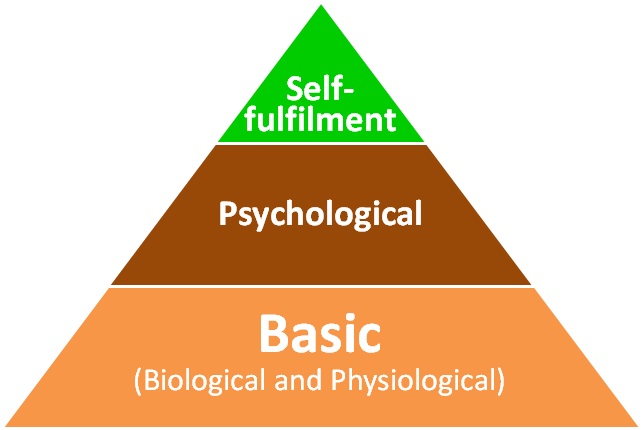 The Maslow Pyramid of human needs. |
| Fast forward to the 21st Century, today we accept our responsibility and duty to take care of the Basic needs and rights of people. Furthermore, we understand that we have a natural desire to fulfill the higher hierarchies’ psychological and self-fulfillment needs once we meet our Basic needs. TYPES OF AGRICULTURE As humankind developed, so did the types of agriculture developed to meet the needs of higher hierarchies.Let us look at the different types of agriculture through the glasses of the Maslow Pyramid. Traditional Agriculture – is made to fulfilling Basic needs, such as food and shelter. It has no inspirations to fulfill Psychological or Self-Fulfillment needs. Yet, 80% of the over 700 million people currently suffer hunger and extreme poverty, live in rural areas for less than 1.9 $/day, and practice Traditional Agriculture. Due to Traditional Agriculture’s inability to generate high income, it has no potential to support human needs beyond the Basic ones. |
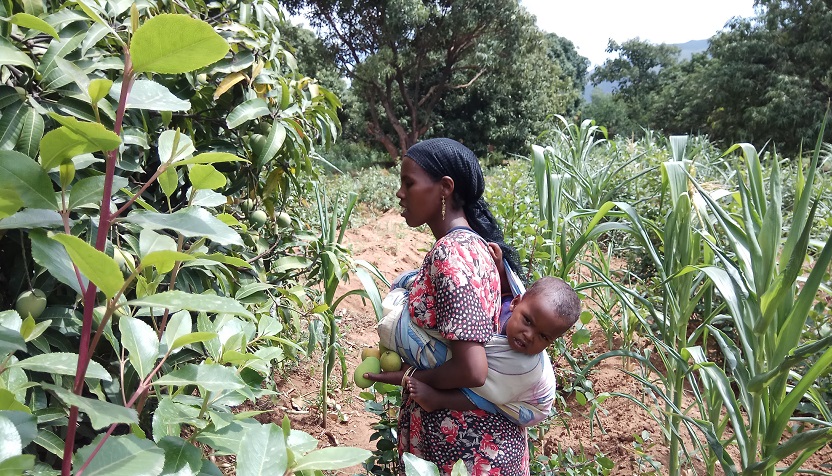 Traditional agriculture. |
| Agri-Industry – also called Conventional agriculture, is made to increase food production and farmers’ income. Hence, it provides plenty of food and enables farmers to satisfy needs beyond the Basic ones. But, Conventional agriculture has many downsides, which makes it unsustainable and short living.For example, excessive use of chemicals damages the health of farmers, consumers, and the environment. Keep in mind that (good) Health is a Basic human need. |
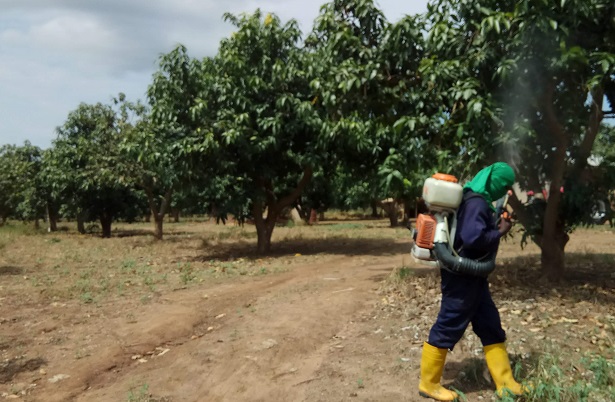 Conventional agriculture heavily relies on pesticide sprays. |
| Another example is the nearly complete focus on ‘increasing income,’ which often results in farmers’ exploitation. The result is persistent poverty, leading to an unfair chance for a life with dignity and farmers’ inability to fulfill their Psychological needs. |
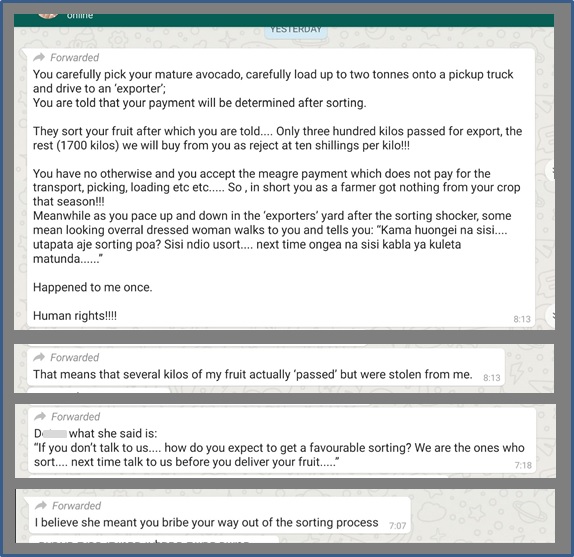 WhatsApp communication between African farmers. WhatsApp communication between African farmers.It reveals the typical exploitation of farmers, leading to the denial of living with dignity. |
| Organic Agriculture – is made to respect better peoples’ health, fair trade, and environmental issues. However, Organic agriculture is still using many sprays, and its typical yield is lower versus Conventional agriculture. Hence, it fails to keep Basic needs due to risking people’s health and its inability to supply sufficient amount of food for the growing global population. From 2.3 B people in 1937 toward 4.3 B in 1978 and 7.8 B today! Green Valley Agriculture – is a NEW type of agriculture approach design to cope with the downsides of the older types of agriculture. It is focused on the fulfillment of values, and in particular, values related to humans, society, health and the environment [>><<]. According to Maslow Pyramid, Green Valley is designed to enable farmers and the entire fresh produce value chain to satisfy their needs while still caring about social and environmental issues, as partially expressed in the UN SDG.If we want to better our world in a remarkable and fast way, we should focus on turning Conventional farming into Green Valley farming. Doing so, we get the perfect mix of high production volume under strict concerns of progressive values, methods and regulations. |
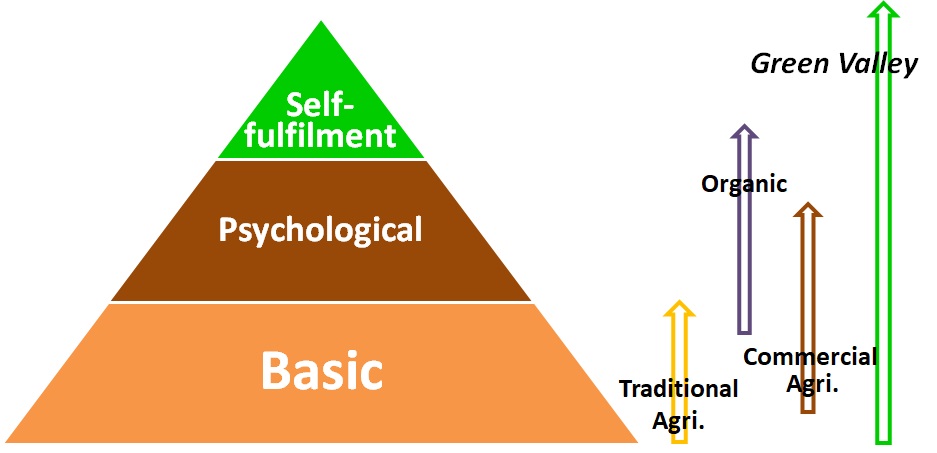 Maslow pyramid of human needs, and how well each type of agricultural approach relates to it. Green Valley produces a higher yield per hectare than other kinds of agriculture while using fewer sprays (and often, zero sprays). Hence, it answers Basic needs better, and its focus on Values promises that it will enable us to meet better higher hierarchy needs.. |
| IS FOCUSING ON VALUES – GOOD OR BAD FOR BUSINESS? Business is an ever-changing environment. In this turbulent environment, you need something to hang on to, something which will guide you in your decisions. What is guiding you, which value do you follow; Money or Human & Environmental ones? Whatever values you choose to follow, make sure you feel genuinely connected to them because the more connected you are to your Values, the easier it will be for you to follow your vision and make the right decision in due time. Is Money your Value? Be careful; Money is an elusive Value and an external source of motivation. To know if you are making the right decision, you need to ask your accountant. Money makes you think and focus on yourself (what do I get?), and therefore you are demotivated when you get less money. Is caring for Human and Environmental issues are your Values?If this is the case, you are lucky because you are using a set of Values that make you focus on others, thanks to using internal motivation sources. To know if you are making the right decision, you need to ask yourself. Your inner conscience and vision will guide you in the darkest nights and be your North Star to brighten your path. Do values affect consumers’ decisions on what and where to shop? It is easy to see that consumers are not fond of companies or people whose highest priority is Money. Consumers are looking to buy and consume produce, representing values, which resonate with their own personal or social core values. We may wonder what happens when there is a gap, a clash between the sellers’ values and buyers’? The answer to that question is demonstrated in the recent incident in which Tesco dropped Kakuzi, an important avocado supplier, because of human rights abuse. “Any form of human rights abuse in our supply chain is unacceptable,” Tesco said [>><<]. Kakuzi is owned by the Camellia group, which employs about 78,000 people across the world and last year made pre-tax profits of £22.3m on turnover of £291.5m [>><<].Still, TESCO chooses values over money because its consumers’ values override its suppliers’ values. |
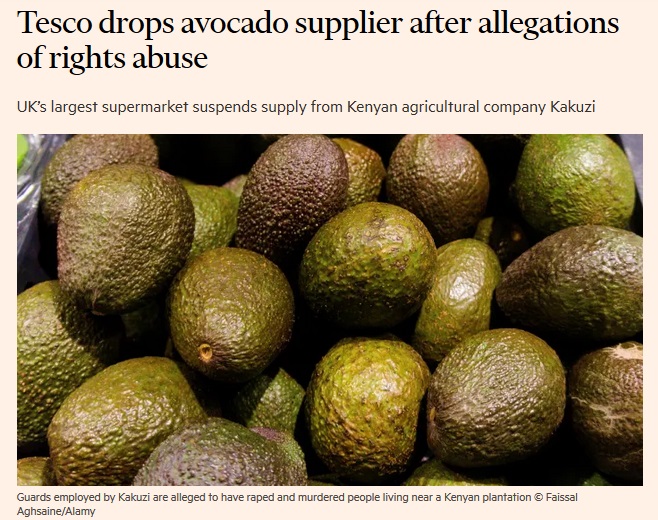 . . |
| Contrarily, consumers love and respect companies, people, and products that represent Values, especially when they can identify and relate to these values.For example, consumers buying Organic produce relate to their values and hence are readily paying a premium price for the right to purchase a product that matches their values.We conclude that humane matters and needs, such as those in the Maslow Pyramid and the UN SDGs, are economically measurable and quantifiable. It means that they are of economic value for food producers, and in particular, for fresh fruits producers.Is the same conclusion is valid for environmental issues? CONSUMERS RESPECT WHEN MEETING HIGH VALUES As explained above, no matter how big and strong you are, consumers want the suppliers to respect their Values. Standing up for those values is, therefore, essential for your business future.At this point, complying with some or all of Maslow Pyramid is a business advantage, maybe even a necessity for doing business, but is it sufficient?No! It can’t be ‘sufficient’ without considering public values in environmental matters.We should thank the Hippies, and Rachel Carson in the 60s, Greenpeace in the 70s, and the Green Movement in the 80s of the 20th Century, for making environmental issues part of our global heritage and shared values.If you want to know how much the public value companies with an environmental vision and business focus, look at Tesla, Electric Car Company, led by Elon Musk.Tesla’s cars are powered by an electric motor rather than an internal combustion engine that produces greenhouse gases. Although Tesla is a small car manufacturer, it has the highest market cap, thanks to its environmental values. |
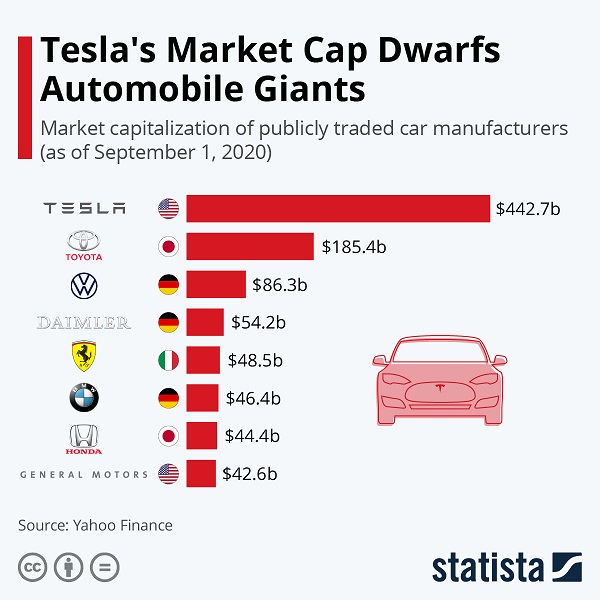 . . |
| What works for Tesla is right for the food industry. Consumers expect food producers to follow and cherish their Human and Environmental values, as expressed in the Maslow Pyramid and the UN SDG.Not complying with those values is often a deal-breaker, and hence a growing risk to the company.In the food industry, the public, through the food chains, know how to punish companies that do not meet these expectations and reward them when they do meet its expectations or do beyond expected.The agri-industry, like the automobile industry, needs to change. Fresh fruits producers can choose to change slowly, as General Motors does, or focus on Human and Environmental values and become a market leader, as Tesla is. What is your choice? START WITH THE VALUES AND SELF-EXPECTATIONS When 30 years ago, I started thinking and imagining how I would like to see the future of the agri-industry, what came up to my mind is a set of Activities; those that you need to DO, and those that you SHOULD NOT DO.Later, I managed to translate those Activities into Values to inspire to achieve, follow, and respect.Those values can be categorized into three groups, which I believe many consumers respect and relate to: Professionalism – We expect the agri-industry to enable an abundance of agricultural produce that meets precise quality characteristics, such as appearance, taste, and smell, while meeting the values we respect, as outlined in the following sections. Human Rights and Needs – We expect the agri-industry to meet human and social values expressed in the Maslow Pyramid and the UN SDGs. For example, we hope to eat healthy produce free of chemical residues and grown by farmers who are well paid and live in dignity. Environmental Requirements – We expect the agri-industry to meet food production requirements while using sustainable technologies and methods and striving to minimize its environmental impact. YOU ARE WHAT YOU EAT Having this vision in mind, I started by developing technologies, methods, and protocols that will confirm with my values, including the value of improving people’s health and the environment. Biofeed had to develop breaking through technology, the FreeDome solution, Methods, and Protocols to achieve that goal. The outcome is the Fruit Fly Certified Trade Zone (FFCTZ) protocol, the top fruit fly protocol for Africa, Asia, and Latin America. Green Valley is a concept package of protocol, methods, and technologies used to bring its novel agri-industry vision to life. It cherishes the pursuit and desire to live in light of higher global values, focusing on enabling humans and society to reach higher needs, and live in harmony with the environment. |
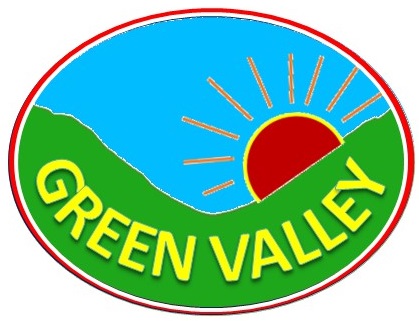 . . |
| Green Valley is designed to enable conscious consumers to impact global society and the environment by consuming fresh produce that best represents their values.Such export quality fresh produce is grown in high quantity while caring for the environment, farmers, and consumers. Green Valley is focused on producing fruits in Africa and Asia, not because it is easy, but because it is hard, and it is the right thing to do to make our world a better place. I am convinced that exporting mangoes and other fresh produce from Africa and Asia offer an outstanding business opportunity for those who seize the moment. If you want to improve your business and trust your mangoes’ quality, contact me, and let’s coordinate our positions and…possible cooperation. By focusing on exporting high-value produce, i.e., mangoes, from emerging markets to premium markets, Green Valley promises a high return to the entire value chain and a better and healthier experience to consumers who love Mangoes. AN OPEN INVITATION This message is for you if you want to double and triple your mango exports in 2021. Within the next twelve months, we intend to implement the Green Valley protocol in several mango farms. Our initial target is to allow exporters/importers and farm owners to experience the comfort, quality, and trust that characterize the operation under Green Valley protocol when exporting to advance / premium markets, such as in Europe. If you are an exporter/importer or a farm owner interested in taking part and implementing the Green Valley protocol in the coming season, please contact me. After a short communication, you will know if you are eligible to become a value chain partner in Green Valley. When you join now, you secure your place as a leader and have a special priority to work with us in the years to come. The invitation is open for all, but a preference is given to African exporters/importers and farm owners who wish to export from mango farms larger than 50 hectares. Please pass this message to someone who needs to see it! |



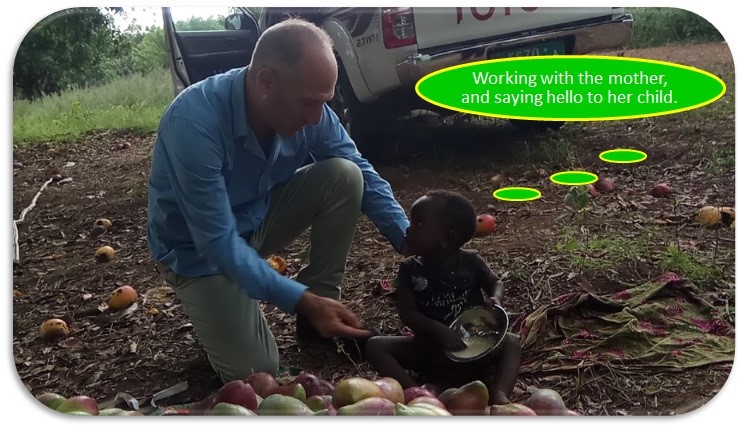

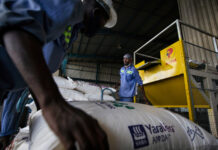

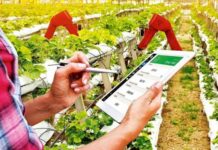

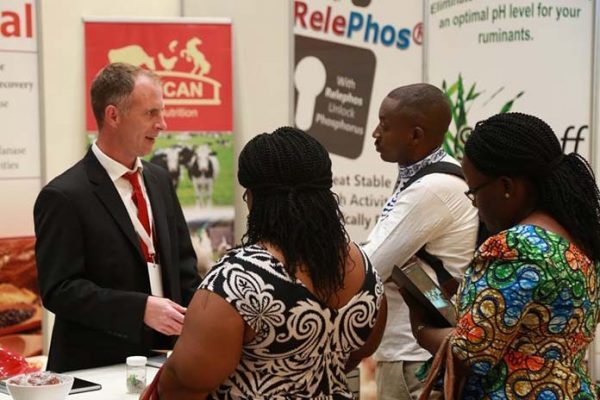
Good and educative information.
Comments are closed.